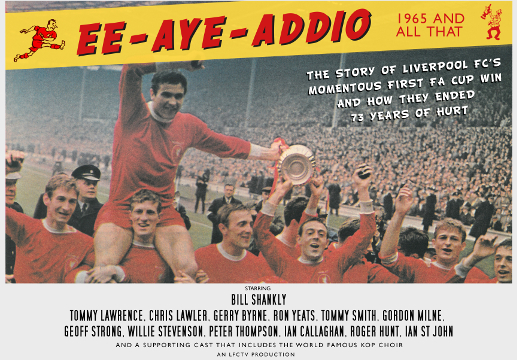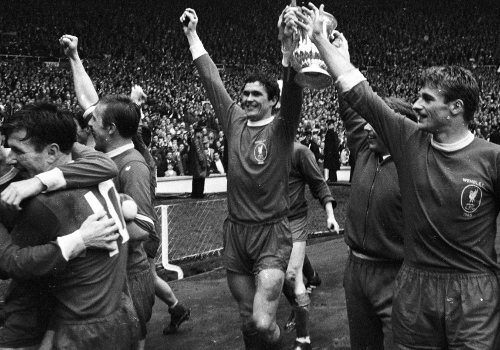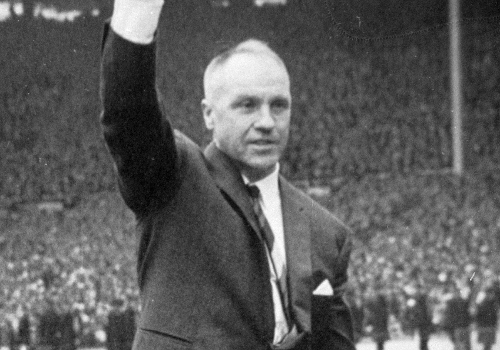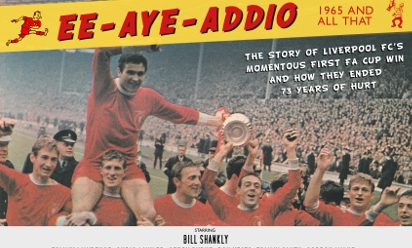Ee-Aye-Addio: Remembering 1965
Liverpool will attempt to move closer to writing another page in the club's glorious FA Cup history this evening when they face a quarter-final replay against Blackburn Rovers.

Those taking to the field will do so hoping to emulate great Reds teams of the past, as they aim to add an eighth success in the tournament to the seven that have gone before.
As recently as 50 years ago, none of that cup history had been written. In April 1965, Liverpool had won the league championship six times, but they had never landed the FA Cup.
The journey to end 73 years of hurt was an epic one. Liverpool had to beat the country's finest sides and overcome a host of tricky encounters in order to bring the trophy back to Merseyside.
It's a story that the club's current crop of players and fans can draw inspiration from and one that can be explored in a new LFCTV documentary - essential viewing for Kopites who want to know all about the traditions today's team seek to uphold.
The Reds' 1965 FA Cup odyssey began at West Bromwich Albion in early January, when goals from prolific strikers Roger Hunt and Ian St John ensured Bill Shankly's side progressed.
Compared to the test posed by the top-flight Baggies, the Reds' next opponents looked considerably less formidable. Shankly's reigning league champions were paired with Stockport County, a team that would finish bottom of the Fourth Division that year, in a game to be played at Anfield.
But Shankly was a notable absentee. He had flown out to Germany to scout the Reds' next European Cup opponents, Cologne. Bob Paisley took charge; however, those expecting a walkover were left in shock when Len White opened the scoring for the underdogs and Liverpool could only muster an equaliser through Gordon Milne, meaning a replay beckoned.
Ron Yeats described Shankly's distaste upon his return. "I think it is possible that maybe we did underestimate Stockport and we were in fact very fortunate to get a draw," recalled Yeats. "Shanks' reaction wasn't too favourable to say the least and quite rightly he blamed us players."
The Edgeley Park replay adhered more to the form book. Hunt's goals at the end of each half put the Reds into round five and they had made amends. "We played much better in the replay and I remember there was a terrific atmosphere," said the forward. "Edgeley Park is a tight ground and the crowd was almost spilling onto the pitch all throughout the game."

Next up were Bolton Wanderers at Burnden Park. A tough trip to face in-form opposition from the league below, but a test the Reds mastered thanks to Ian Callaghan's intervention five minutes from time.
The quarter-finals required a replay after Liverpool's bogey side, Leicester City, secured a 0-0 draw, before Shanks' men clinched a 1-0 victory in the return at Anfield. The Reds were through to the final four and the prospect of ending that mammoth wait for the cup beckoned.
The semi-finals consisted of Liverpool, the reigning league champions, Manchester United, who would go on to win the league that season, Leeds United, who'd finish runners-up, and Chelsea who clinched third.
Chelsea would be the Reds' opponents in the semi-finals, a side who were then top of the league and boasted players like Ron 'Chopper' Harris, Bobby Tambling and Terry Venables. The Blues were reportedly so confident of winning that they'd already printed a cup final brochure - which Shankly duly pinned up on the dressing room wall.
Chelsea's confidence was not without foundation as the Reds barely had time to draw breath before the semi-final after winning a European Cup quarter-final against Cologne on the toss of a coin.
But Shankly had a plan to deal with any potential fatigue. Hunt recalled: "Normally, we tried to beat teams by incessant attacking, but this time they advised us to conserve our energy by letting the ball do the work. We played some lovely football that day, the sort of fluid passing game that the club became famous for later, and it paid off."
It paid off because Shankly's side ran out 2-0 winners, with Peter Thompson putting the Reds ahead on the hour and Liverpool doubling their lead after 79 minutes via a Willie Stevenson penalty.
The final would be a brutal affair against Don Revie's Leeds United - a side who were notoriously tough and uncompromising, with even flair players like Billy Bremner also having reputations as hardmen.
Leeds had just missed out on winning the league on goal difference, and were marginal favourites as West Yorkshire and Merseyside descended on Wembley for the final. Scousers, though, outnumbered the Yorkshiremen present in a crowd of 100,000.

The city itself was rocking with a wave of optimism due to the success of Merseybeat and The Beatles, and now all that was left was for the football club to bring home the world's most famous domestic cup trophy.
Shankly later talked of the incredible role Reds supporters played that day. "The whole of Liverpool came alive in the 1960s; the city became world-famous because of the Beatles and other pop groups and the supporters of Liverpool Football Club became world-famous as well," he remarked.
The match itself, though, lacked the 'swinging '60s' style of the crowd. No game that pitted the likes of Tommy Smith, Callaghan and Yeats against Norman Hunter, Johnny Giles and Bremner was likely to be anything other than hard-fought.
Just minutes into the game, Gerry Byrne, the Reds' left-back, broke his collarbone in a challenge with Bobby Collins. These were the days before substitutions, and it would have meant Shankly's men having to play on with 10 men. It seems scarcely believable now, but Byrne heroically played out the entire game in agony.
In the London rain, both sides tried in vain to break the deadlock - in the second half in particular, Liverpool were thwarted time and time again by the bravery of 20-year-old Leeds goalkeeper Gary Sprake.
Finally, three minutes into extra-time, the goal came, from who else but Hunt - the Reds' leading scorer that season - who angled a cute header into the net. Incredibly, given his injury, the cut-back came from Byrne, still making marauding runs despite his discomfort.
Leeds, though, were not prepared to give in easily and a Bremner scorcher levelled things up fewer than 10 minutes later.
Liverpool could have easily crumbled, especially with a huge game against Inter Milan in the European Cup semi-final just three days later. A replay would've undoubtedly suited Revie's side due to those European commitments.
But Yeats, St John, Hunt and co weren't about to leave the red hordes disappointed - and with the Wembley clock running down, St John made it 2-1 with a beautiful downward header.
73 years of hurt were over and Liverpool had won the cup. A fitting footballing addition to the city's cultural invasion of London in the 1960s and confirmation that 1964's league title win was not merely a one-off success. The Reds would return to the top of the league the next season, and the glory of the 1970s and '80s has made the club a footballing power ever since.
The steel and determination that saw Shankly's side at last win the club an FA Cup trophy is the kind of attitude Brendan Rodgers' team will need 50 years later as the club hope to lift the cup for the first time since 2006.
'Ee-Aye-Addio - 1965 and all that: The story of Liverpool's momentous first FA Cup win' is a 70-minute documentary featuring interviews with many of the key players involved in the momentous cup win. The programme will air for the first time on LFCTV on May 1.



